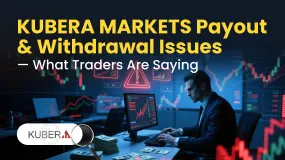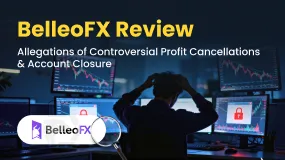WikiFX - Alert: Beware of Belize FSC-Licensed Broker 24Option
Abstract:Financial losses are part of forex trading, but falling prey to scammers is devastating.

Since forex is one of the world's most liquid markets with an average daily turnover of 6.3 trillion U.S. dollars, it has always been the hotspot for money stealers. 24Option is also one of the flagged entities reported for scamming clients on various platforms repeatedly.

What Is 24Option?
Founded in 2008, 24Option is a forex and binary options broker based in Cyprus. Before 2017, the company was a pure binary options trading firm. However, it ceased offering binary options trading after being reported on various platforms for its malpractices concerning funds withdrawals and price manipulation. Subsequently, it started supporting forex and CFD trading. Although the company's official website isn't accessible these days, it keeps disguising clients through several similar websites redirecting to 24Option.
How 24Option scam clients?
24Option used different methods to trap clients, including email marketing and follow-up calls. Approaching clients via telephonic calls and luring them into profit-making opportunities followed by bonus offers on deposits was one of the most common practices of the company.
After receiving funds, the company used to provide clients with poor money management strategies to trade, leading them to lose their account balances. According to clients, account managers first asked them to follow their instructions. Later they baselessly accused clients of wrongdoing.



On August 10, 2021, Israeli and German Police arrested alleged scammers behind 24Option on account of looting millions of Euros from investors.

According to an article published on the “Times of Israel” website, the company allow clients to wager on currencies, commodity, stock, CFDs, and cryptocurrency price movements. According to TOI, 24Option manipulates investors' trades, so they consistently lose their funds.

Moreover, Rodeler Limited and its local company Rodeler (NL), operating under the brand name 24option.com were fined €15,000 by the Dutch financial supervisory body for violating the country's General Administrative Law Act.

According to online resources, the agency requested recordings of telephonic conversations between Rodeler NL and clients. However, the Rodeler NL failed to produce the required call recordings, obstructing the AFM's oversight and breaking mandatory requirements.
On the other hand, if a client is fortunate enough to survive some time, access to his deposited funds will still be limited. The company doesn't process withdrawals or impose a hefty withdrawal fee.

Is 24Option Regulated?
24Option conducts business activities under the direction of the Belize FSC, bearing the license number 000307/19. The broker is not regulated anywhere else.
It is worth mentioning that even if a broker is regulated, you can still get scammed. Regulators only define rules and require registered companies to abide by them. If a firm is found guilty of breaching the code of conduct, they have the legal authority to impose financial penalties and revoke its permits to operate.

Bottom line
24Option seems to have ceased its operations since its website isn't accessible. However, scam entities always find their way to fool around people. A few online websites keep posting positive reviews about the company and redirect potential clients to similar websites, which is probably another scam setup hosted by 24Option.

Read more

KUBERA MARKETS Payout & Withdrawal Issues — What Traders Are Saying
Did you fail to receive payouts from KUBERA MARKETS despite successfully passing the trading challenge? Failed to log in to the trading account despite passing both the evaluation and funded phase? Were you surprised by the sudden nominal fee norm to receive a funded account? Did you have to go through a long withdrawal process? We have investigated these user claims while preparing this KUBERA MARKETS review article. Keep reading!

BelleoFX Review: Allegations of Controversial Profit Cancellations & Account Closure
Have your past good experiences been marred by recent cases of profit cancellations by BelleoFX, a Mauritius-based forex broker? Has your trading account been blown away by the broker’s official upon your refusal to deposit more? Did the broker’s official tell you to deposit more, even if the earlier attempt turned unsuccessful? Did the high-return promise fall flat on the ground? In this BelleoFX review article, we have investigated these allegations. Take a look!

Is Dbinvesting Real or Fake: A Simple Check to See if This Trading Company Can be Trusted
When a trading company like Dbinvesting shows up and says it's an experienced partner with great deals like high leverage up to 1:1000 and different account types, it gets people's attention. But this appeal gets clouded by more and more serious complaints from users. This creates a big problem for people thinking about investing. The main question that needs a clear answer based on facts is: Is Dbinvesting legit, or is it a clever scam that could cause you to lose a lot of capital? This investigation wants to give you that answer. We will look past the company's marketing claims to study facts we can check. Our study will carefully look at the main worries: Is Dbinvesting watched over by a trustworthy authority? What are the real, honest experiences of people who used it? Are the many reports about withdrawal problems and Dbinvesting scam claims believable? To do this, we will use solid data from third-party checking services, such as WikiFX, including their complete regulatory check

Dbinvesting Complete Review (2026): A Detailed Look at Safety, Costs, and Customer Experiences
An Honest First Look When checking out a forex broker, the main question is always about trust: "Is Dbinvesting a safe place for my investments?" This review answers that question directly. Dbinvesting says it's an experienced broker that offers the popular MT5 platform, different account options, and access to worldwide markets. But as we look closer, we find a very different story. Our research found serious warning signs, especially its weak overseas regulation and a very low trust score from independent reviewers. This review gives you a short summary of what we found, comparing what the broker promises with the serious problems shown by real data and lots of user feedback. We want to give you a clear, fact-based answer to help you understand the major risks before investing. The difference between what it promises and what users actually report is the main focus of our investigation.
WikiFX Broker
Latest News
CySEC Withdraws CIF License of OBR Investments Ltd (OBRInvest)
Arena Capitals User Reputation: Looking at Real User Reviews and Common Problems
What Will US-Iran War Affect Stock Market: A Comprehensive Investor's Guide to 2026
Is FINOWIZ Safe or Scam? 2026 Deep Dive into Its Reputation and User Complaints
FX Deep Dive: Dollar King Returns as Energy Shock Splits G10 Currencies
The 25-Day Tipping Point: Energy Markets Stare Down a Hormuz Blockade
Eightcap Review: Understanding Fees, Features, and Important User Warnings
Exnova Review 2026: Is this Forex Broker Legit or a Scam?
Stop Letting Your Trading Rewards Gather Dust: A Limited-Time 30% Opportunity
Middle East Escalation Rocks Markets: Oil Surges while Brokers Tighten Leverage
Rate Calc

